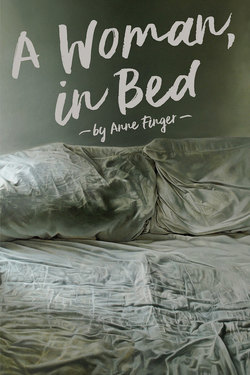Читать книгу A Woman, In Bed - Anne Finger - Страница 14
На сайте Литреса книга снята с продажи.
ОглавлениеBlue
In Istanbul, the Prussian blue that formed the backdrop of Luc’s blueprints of the trestle bridges that would span the canyons and crevasses, the tunnels that would bore through mountains, stained his fingers, despite his scrub brush. (He cared for his body as he did for his polished wood and brass engineering tools, which he buffed with a chamois cloth before returning to their leather cases.) He would touch her with his tinted hands, leaving a stroke of blue on the edge of her jaw, a smudge circling her breast like a faint tattoo. A deep blue, almost a bruise, where he had thrust his fingers inside of her, worked the heel of his palm back and forth. She would forego her customary bath, wanting to keep the traces of his lovemaking on her skin.
One day, Luc had come home and seen a pile of Turkish books higgledy-piggledy on the floor next to her chair on the verandah. His wife told him she had engaged a young poet of their mutual acquaintance to tutor her in the Turkish language.
At dinner that night he said: “Ni devus lerni Esperanton. Ĝi estas malŝparado de tempo por lerni turkan.” Simone laughed.
His dignity wounded, he brought his linen napkin to his mouth, wiped his mustache and lips.
“I’m sorry. What did you say?”
“I spoke in Esperanto.” He stopped himself from saying my dear. “The universal language. We should learn it, speak it to our children when that time comes. It is a waste of time to learn Turkish.”
“The letters are so beautiful. My favorite are kaf and çim.” She stroked the shape of the letters in the air.
He knew at that moment his wife would not be faithful to him. It was not the tutor he feared being cuckolded by—the man’s tastes did not tend in that direction—but by a gerund.
Despite knowing that truth, he plowed on: the Turks themselves were abandoning the Arabic alphabet, changing to the Roman, part of shedding their Ottoman past, becoming modern, just as they intended to scrub the language clean of words that had been borrowed from Arabia and Persia. (Beware the gifts foreigners leave at your gate, even if these are only Arabic words for pus and wisdom, the Farsi words for enemy and footloose.)
The poet told her there was no word for être and avoir, “to be” and “to have” in Turkish. “How do you say, ‘I am…’, ‘I have…’? she asked. “Ah,” he said, “we do not say such things as crudely, that is, as directly, as you Europeans—I mean, you Western Europeans—do.” She wanted to dive into this language, to swim in its waters thick with silt, in that sea of the past and shame and languor, to allow a tiny bit of the foul water to seep into her mouth.
